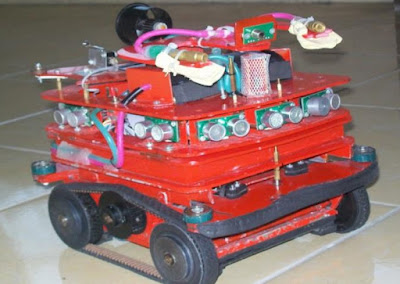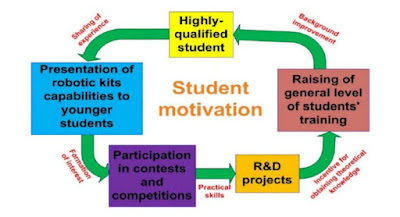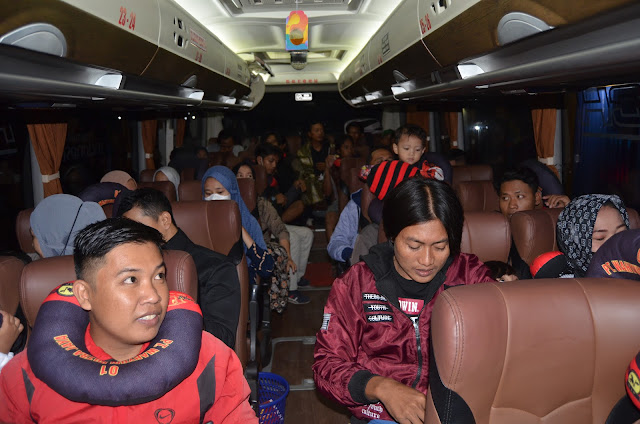The development of robot technology has grown rapidly. Robots have been widely used in various aspects to help human’s interests. In the education sector, robots have also been used as a learning tool to assist in studying fields such as science and technology. Currently, to encourage the development of robots in the education sector, robot competitions are held with various kinds of events. The types of robots developed to participate in robot competitions are also varied, such as mobile robot contest, modular robot contest, humanoid robot contest, flying robot contest, underwater robot contest, innovation robot contest, brick robot contest, and VR robot contest. The robot competition events are held nationally and internationally. The purposes of this study were to identify what kind of skills obtained by students after following the learning process using educational robotics competitions and to determine the appropriate learning model for the use of educational robotics competitions in studying the field of science and technology.
The results showed that the learning model that was widely used in educational robotics competitions was project-based learning and was followed by problem-based learning. The skills obtained were to assist understanding science and technology, to develop computer programming skills, to sharpen problem-solving capability, to foster creativity and innovation, to bridge the gap between theory and practice, and to practice teamwork and social skills.
Robot competitions can promote the development of robots in the sector of education rapidly. Through robot competition, it is able to give information and to get access for students to advance the accomplishments in science and technology, to supply grants for the development of knowledge and, and to provide educational institutions with modern teaching programs for achieving practical skills and theoretical knowledge. lThe impact of the robotics competitions on the students’ interest is to make students more deepen the knowledge toward science and technology.
Robots can attract students' attention to learn learning materials related to robots. The use of robots as a learning tool has been widely used to assist learning. Learning using robots or often referred to as educational robotics can be used for different environments. The educational robotics can be held in an ordinary school program or after-school programs. Meanwhile, using educational robotics for the competition taught in schools is called educational robotics competition. The educational robotics competition is capable to develop students to encourage knowledge and achieve practical skills and scientific experience during the learning process. As a consequence, new skills are immediately applicable to implement robotics practice. The objectives of this research are to identify what kind of skills that are obtained by students after following the learning process using educational robotics competitions and to identify the appropriate learning model for the use of educational robotics competitions in the field of science and technology.
Skills are one of the learning outputs resulting from the learning process in the classroom. Skills are needed to determine the level of students’ understanding of the theory being learned. The skills that students acquire can be trained in the learning process. The various types of skills obtained are following the learning design in the classroom. The use of robotics competition in classroom learning can develop students’ skills. The educational robotics competitions have some advantages such as: to inspire the students in learning STEM, to help the student to understand science and technology, to develop computer programming skill, to sharpen problem-solving capability, to develop design and integration skill, to foster creativity and innovation, to cultivate the technical skill, to bridge the gap between theory in the class and practice in the real world, to practice teamwork and social skills and to improve presentation skill.
The use of robotic competition in classroom learning is an interesting thing. This is because students can directly practice the theories that they get in class to be practiced directly in the form of a robot competition they want to participate in. For this reason, it is necessary to determine the appropriate learning model to teach robot competition in the classroom. Some researchers suggest using project-based learning. This is because students can directly apply robot projects aimed directly at the competition. Some researchers used problem-based learning using educational robotics competitions. The use of problem-based learning can train students problem-solving skill. This skill is needed when
there are problems arise when the robot competition is taking place, how students can solve the problems that arise as quickly as possible so that they can win the competition.
Conventional learning which has only been involved in theories is deemed less attractive to students, especially those who study science and technology. The development of practical skills and mastery of theoretical knowledge is needed by students in facing today's challenges. Educational robotics competition is a way for students to develop practical skills and mastery of theoretical knowledge. The use of educational robotics competitions can develop students' practical skills through the direct practice of arranging modular robots and operating robots. The use of learning models such as project-based learning, problem-based learning, student self-centered learning, and goal-oriented learning experiences in educational robotics competitions can help students to increasingly master theoretical knowledge.




















